Well, hello again, dear readers. If you’ve been wondering why the blog has been quieter than a Parisian absinthe bar during Prohibition, rest assured: I haven’t been abducted by the Green Fairy (at least, not permanently).
No, the truth is I’ve spent the last six months on an unexpected sabbatical from both writing and, frankly, any semblance of normalcy.
In a fit of eccentricity or perhaps just fate’s sense of humor, I decided to ring in 2025 not with fireworks or champagne, but with a glamorous stint in the Emergency Room. After all, I reasoned, if you start the year at rock bottom, things can only improve.
(Spoiler: I was right, but the journey upward has been anything but straightforward.)
It was there, between the beeping machines and the diet of hospital beef broth (which seemed, to me, a banquet), that I received a diagnosis I’d only ever heard about in pharmaceutical commercials: Crohn’s Disease.
Suddenly, months of mysteriously painful stomach woes and dietary detours made sense, though I can’t say I was necessarily thrilled to join this exclusive club.
But the real highlight of my hospital stay? A conversation with my doctor that started with a nervous laugh and ended with both of us pondering the medicinal potential of absinthe. (More on that Wildean twist in a moment.)
For now, suffice it to say that life’s greenest surprises sometimes come in the unlikeliest bottles… and hospital gowns…
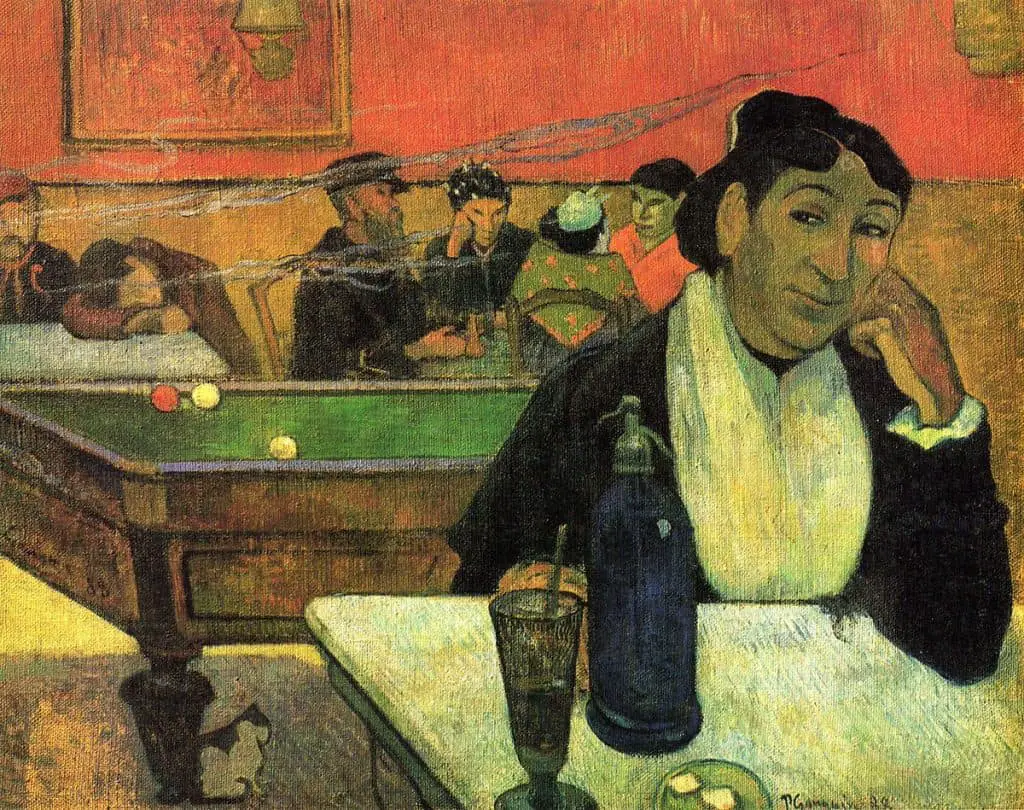
How Crohn’s Shows Up for Me
One of the most bizarre things I’ve learned since my diagnosis is that Crohn’s disease is a bit like an unpredictable houseguest: it never shows up the same way twice, and it’s always full of surprises.
While it’s notorious for crashing the party in people’s late teens or early twenties, I apparently decided to be fashionably late to the Crohn’s soirée. Here I am in my mid-thirties and only just now getting my invitation.
During my hospital stint, I had the pleasure of sharing this revelation with my doctor. Though the real fun began when our conversation took a sharp left turn into absinthe territory.
I wish I could bottle the look on his face: a cocktail of nervous laughter, professional concern, and just a dash of curiosity.
Once he realized I wasn’t suggesting we swap my IV for a glass of vintage verte, he was genuinely intrigued by my questions about wormwood and its potential effects on Crohn’s.
(Though I suppose it’s not every day your patient comes armed with both a diagnosis and a working knowledge of 19th-century spirits.)
Crohn’s Disease, as I learned, is remarkably different from person to person.
As for my personal Crohn’s experience, I seem to have been spared the more infamous digestive dramas, i.e., no adrenaline-fueled sprints to the bathroom, and no mysterious disappearances for days on end.
My intestines, it seems, prefer a more theatrical approach. Instead of the usual digestive chaos, I get to enjoy bouts of pain that feel less like a stomachache and more like Mike Tyson has set up a training camp in my abdomen, throwing uppercuts for three to five days at a stretch.
Of course, these episodes come with a generous side of sleep deprivation and a general sense of being thoroughly walloped.
Unlike many fellow Crohn’s travelers who can point to a rogue food as their nemesis, months of meticulous testing have yet to reveal a single reliable “trigger food” for me. Instead, my gut seems to have developed a flair for the dramatic: anger, stress, anxiety, sadness, or even grief can send me spiraling into a flare within ten to fifteen minutes.
My new reality involves being hypervigilant about keeping my emotions under lock and key. That said, think less “zen master” and more like “emotional bomb squad.”
On the upside, I’m getting oddly attuned to the subtle cues from my digestive system. It’s like a gut-based weather forecaster, always scanning the horizon for storms.
But I’m still new to this, and at the moment, there are far more snakes than ladders on this particular board game.
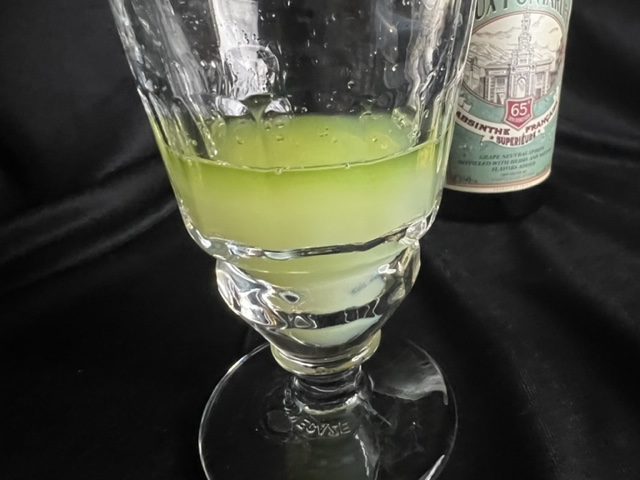
Experimenting with Absinthe: My Unlikely Remedy
Now, if you’d told me a year ago that my deep and abiding love for absinthe would end up having a practical application beyond dazzling my friends with Oscar Wilde quotes and seizing any opportunity to show off my French pronunciation, I would have laughed you right out of the bar.
And yet, here we are: my quirky little hobby has become, if not a cure, then at least a curious companion on this Crohn’s journey.
After my diagnosis, I found myself in the odd position of having to rebuild my entire relationship with food, drink, and my own body.
For a while, absinthe, once my favorite muse, became just another item on the “maybe never again” list. But as the months passed and I started to get a handle on my new normal, curiosity (and, let’s be honest, a touch of stubbornness) got the better of me.
So, I began to experiment. Carefully, cautiously, and always with an eye on how my gut would respond, I started reintroducing absinthe in small doses.
To my surprise (and mild delight), I noticed something remarkable: if I caught a flare-up early enough, or sipped a little after the worst of the symptoms had passed, absinthe seemed to take the edge off the pain.
Not a miracle or a magic bullet, but a gentle, green-tinted nudge toward feeling… well… human again.
There’s a certain irony in the fact that my long-standing fascination with the “devil in a green bottle” has turned out to be more useful than I ever dreamed. While most people collect absinthe spoons or vintage labels, I appear to have collected a legitimate reason to keep experimenting.
All in the name of science, of course…
Is it the wormwood? The ritual? The placebo effect? Or perhaps just the joy of reclaiming a small piece of myself in the midst of so much upheaval?
The jury’s still out, but I’m more than happy to keep conducting “research” (for the sake of the blog, naturally).
Recommended: Debunking Absinthe Myths

Science vs. Anecdote: Navigating the Evidence
Now, before you imagine me donning a lab coat and declaring absinthe the next big breakthrough in gastroenterology, let’s talk about the difference between personal experience and scientific evidence. This is a distinction that’s almost as important as knowing your Pontarlier from your Pernod!
As a graduate student with access to more research databases than is probably healthy, I dove headfirst into the academic literature on wormwood and Crohn’s.
To my delight (and, let’s face it, vindication), I discovered a handful of studies suggesting that grande wormwood (i.e., the star botanical in real absinthe) might actually have anti-inflammatory effects, particularly in the context of Crohn’s disease.
Some small clinical trials found that wormwood supplements could reduce symptoms and even help patients lower their reliance on steroids. (If you’re a fellow research nerd, I’ll include details and citations in the next section.)
But here’s where things get tricky…
My experience of sipping absinthe and feeling some relief makes for a great story, but it’s still just that: a story. The research, while promising, is limited, and most studies use wormwood extracts or capsules, not the bohemian beverage we all know and love.
Plus, as every Crohn’s patient knows, what soothes one person’s gut may send another’s into full revolt.
That’s why I try to keep both feet planted (preferably not in the ER) in the world of evidence-based medicine, even as I explore what works for me.
Personal experimentation has its place (especially when you’re dealing with a disease as individualistic as Crohn’s), but it’s no substitute for rigorous science. The trick, I think, is to be open-minded but not gullible, curious but cautious, and always willing to learn from both the data and the day-to-day realities of living with this condition.
So, while my absinthe adventures are ongoing, I’m not about to launch a “Green Fairy Protocol” just yet.
But I am keeping notes, asking questions, and hoping that sharing my story might inspire a little more research and maybe a few more raised eyebrows in the medical community.
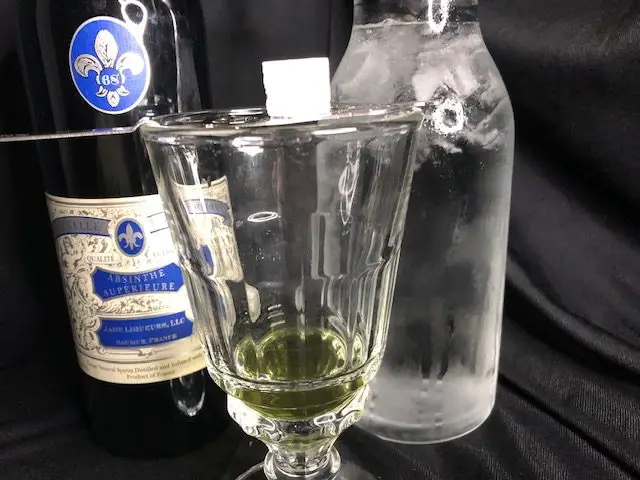
Scholarly Spotlight: What the Research Really Says About Wormwood and Crohn’s
Let’s set aside the anecdotes and absinthe spoons for a moment and take a look at what the lab coats and peer-reviewed journals have to say about wormwood’s role in Crohn’s disease.
Over the past two decades, a handful of intriguing studies have suggested that wormwood (Artemisia absinthium), which is the very same herb that gives absinthe its allure, might have real, measurable benefits for people with Crohn’s.
In one notable double-blind, placebo-controlled study, patients with Crohn’s disease were given wormwood supplements over an eight-week period.
The results?
Nearly 65% of those taking wormwood achieved almost complete remission of symptoms, while the placebo group saw no such improvement. Even more impressively, many participants were able to reduce or discontinue their steroid medications during the trial (PubMed).
But how does wormwood work its magic?
The research points to its ability to suppress tumor necrosis factor alpha (TNF-α), a key player in the sheer force of inflammatory chaos that is Crohn’s. By dialing down this inflammatory signal, the wormwood appears to help restore a bit of peace in the digestive tract (ScienceDirect).
Of course, it’s important to note that these studies used standardized wormwood extracts, not the absinthe you’ll find on your favorite backbar. The dosages, preparations, and safety profiles are all carefully controlled in a clinical setting, so while the findings are promising, they’re not a green light for self-medicating with cocktails.
Still, the research is encouraging. It suggests that the ancient reputation of wormwood as a gut remedy isn’t just folklore and that there’s real potential for further exploration.
For those of us living with Crohn’s, it’s a rare and delightful thing to see our peculiar interests validated by the scientific community, even if only in early studies.
So, while the jury is still out and more research is needed, the scholarly verdict on wormwood and Crohn’s is: “Intriguing. Needs more data. Worth another round.”
And if that’s not an invitation for more research (and perhaps a little more absinthe-fueled curiosity), I don’t know what is.
Recommended: Famous Absintheurs You Should Know!

The Alcohol Question: Contradictions & Considerations
Now, just so that nothing here is being misunderstood, I need you to understand that I am not a doctor, nor do I play one on the internet.
I’m literally just a dandy green devil with a penchant for absinthe and witty banter that you found online. That’s it.
I have nothing but respect for medical professionals, and I want to be absolutely clear that I am not recommending that anyone disregard their doctor’s advice in favor of chasing the Green Fairy. No reputable physician is going to prescribe you a nightly glass of absinthe, no matter how poetic your symptoms.
The line between medicine and poison is often just a matter of dosage, and that’s a calculation best left to those with actual medical degrees (and a working knowledge of the Hippocratic Oath).
Alcohol, in particular, is a notorious wildcard for those of us with Crohn’s. For many, it’s a surefire way to trigger a flare, and the risks are real. If you’re reading this and considering your own foray into “medicinal” absinthe, please, please, PLEASE talk to your doctor first.
That said, I’m very much aware of the risks I’m taking in my own little experiment. I’ve weighed the pros, cons, and historical footnotes, and I’m comfortable with my choices.
It’s worth remembering that absinthe was originally created by Dr. Pierre Ordinaire as a medicinal tonic for gut health. Though even in his day, wormwood was already considered an “ancient cure,” with roots stretching back to the ancient Egyptians and beyond.
(Side note: let’s just take a moment to appreciate the fact that my current coping mechanism was old news before the pyramids were finished.)
So, while I’m not suggesting anyone else follow my exact path, I do believe there’s value in sharing my story: warts, risks, and all.
If nothing else, maybe it will inspire a little more curiosity, a little more research, and perhaps one day, a clinical trial or two with an absinthe bottle on the lab shelf.
Until then, consider this an unexpected chapter in my ongoing absinthe odyssey: a story I never expected to tell, but one I’m oddly grateful to share.

Tips for Experimenting Safely (If You Must)
Now, for those intrepid souls who are reading this and thinking, “Maybe I should try a little Green Fairy therapy myself,” let’s talk practicality and safety because, as much as I enjoy a good story, I enjoy functioning internal organs even more.
First, a confession: in the spirit of scientific curiosity, I’ve experimented with more than just absinthe.
I’ve tried wormwood oil in carefully measured doses (specifically this one), and, yes, there was some benefit (enough to make me pay attention, at least.)
But, fittingly, nothing seems to quite compare to the peculiar magic of absinthe itself.
Whether it’s the blend of botanicals, the ritual, or simply the joy of reclaiming a cherished part of my life, absinthe seems to work better for me than wormwood alone. (Clearly, Dr. Ordinaire was onto something with his original recipe.)
That said, if you’re considering your own experiment, here are a few humble suggestions from someone who’s learned the hard way:
- Start Low, Go Slow: Whether it’s wormwood oil, absinthe, or any new addition to your routine, begin with the smallest possible amount. Your gut will let you know if it’s a fan or not.
- Track Everything: Keep a journal of what you try, when you try it, and how you feel afterwards. Patterns can be sneaky, but they do emerge.
- Moderation is Key: Absinthe is best enjoyed in moderation (and, ideally, with a sense of occasion). Overindulgence won’t win you any points with your digestive system.
- Don’t Skimp on Quality: Low-quality absinthes aren’t just an insult to your palate, but they will likely lack the wormwood your gut may need if you’re struggling with Crohns or a similar issue. My highly-rated absinthe reviews are a great place to start if you’re unsure what bottle to get, whether for flavor or experimentation, and are what I have been using personally.
- Consult Your Doctor: Seriously, this is not a journey to undertake solo. Let your medical team know what you’re up to. If they raise an eyebrow, that’s the time to have a serious conversation.
- Listen to Your Body: No two Crohn’s cases are the same. What soothes me might rile you, and vice versa. At the end of the day, your own experience is your ultimate guide.
Consider this my unofficial “absinthe protocol”: equal parts caution, curiosity, and a healthy respect for the mysteries of both medicine and the Green Fairy.
If you do decide to experiment, may your journey be gentle and your results enlightening. Oh, and may your absinthe always be the real deal!
Recommended: How to Prepare Absinthe the Right Way (For Beginners)
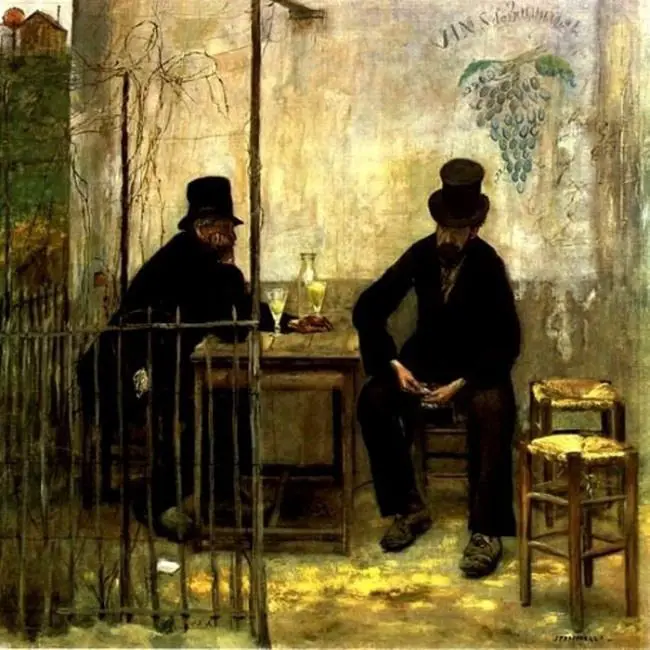
My Hopes for the Future
As I swirl the last drops of my latest “research sample” in the glass, I can’t help but reflect on how unexpected this chapter of my absinthe journey has become. What started as a personal experiment with equal parts desperation and curiosity has grown into something I genuinely hope will spark broader conversations.
My wish is simple: I want to see more research into the potential of wormwood and absinthe for Crohn’s disease and other gut ailments.
There’s a tantalizing glimmer of promise in the studies I’ve read, and I know I’m not the only one wondering if there’s more to this than just folklore and placebo. If sharing my story helps chip away at the stigma around “unconventional” approaches or encourages a scientist out there to take a closer look, then I’ll consider this experiment a success.
I also hope this article finds others who are navigating their own winding paths with Crohn’s (or any chronic illness, really).
If you’ve ever felt alone in your symptoms, your coping mechanisms, or your quest to find what works for you, know that you’re in good company. The more we share, the more we learn, and the more we can advocate for research that reflects the real, messy, and unpredictable lives we lead.
And, of course, if any absinthe distilleries are reading this and feel inspired to sponsor a little more “field work,” my inbox is always open. After all, what’s science without a patron or two?
(Hey, it doesn’t hurt to ask, eh?)
But anyways… Here’s to curiosity, community, and the hope that the next chapter, green-tinged or otherwise, brings us closer to answers, relief, and maybe a few good stories along the way.
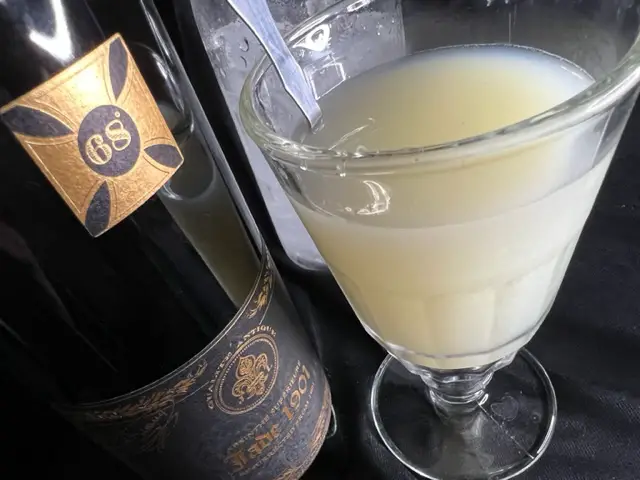
Epilogue: Wit, Resilience, and the Absurdity of It All
If Oscar Wilde taught us anything (besides the importance of a well-timed bon mot and the dangers of wallpaper), it’s that life’s absurdities are best met with wit, style, and a touch of irreverence.
Living with Crohn’s has, in its own peculiar way, made me appreciate that lesson more than ever.
You have to admit that there’s a certain comedy to finding oneself in a hospital bed, discussing the finer points of absinthe with a hilariously baffled doctor. Or to realizing that the same elixir that once inspired poets and painters is now helping me navigate the unpredictable landscape of my own insides.
Chronic illness, I’ve learned, is nothing if not an exercise in resilience. Sometimes, the only way through is to laugh, adapt, and raise a metaphorical (or literal) glass to the journey.
So here’s to the snakes and ladders, the setbacks and small victories, and to finding comfort in the most unexpected places. May we all have the courage to experiment, the wisdom to listen to our bodies, and the humor to toast our own absurd adventures.
As Wilde himself said, “To live is the rarest thing in the world. Most people exist, that is all.” Here’s to living, my friends, Green Fairy and all!
Finally, as a reminder, always consult a medical professional before making changes to your treatment or experimenting with new remedies, whether absinthe-inspired or otherwise.
If you have experiences, questions, or resources of your own, I’d love to hear from you. The more we share, the more we learn (and the better our next toast will be).
Until next time, my friend.
Santé!

